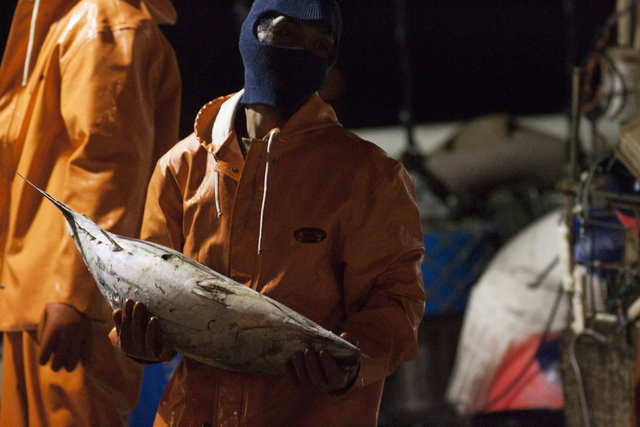Land board denies changes for rules for foreign fishermen

ASSOCIATED PRESS
A man unloaded fish from the U.S. fishing vessel, the Sea Dragon, at Pier 38 in Honolulu. A Hawaii state agency is considering a petition today to change rules for commercial fishing licenses given to undocumented foreign fishermen.
A Hawaii agency today denied a petition to change state rules for commercial fishing licenses given to undocumented foreign fishermen.
The petition sought changes in the licensing process that included certifying that the applicants understood what they were signing. Many of the foreign fishermen who work in the fleet do not read, write or understand English.
With no legal standing on U.S. soil, the men are at the mercy of their American captains on American-flagged, American-owned vessels. Since they don’t have visas, they are not allowed to set foot on shore, so captains or their agents often prepare their licensing documents for them.
The entire system, which contradicts other state and federal laws, operates with the blessing of high-ranking U.S. lawmakers and officials, an Associated Press investigation published in September found.
A federal loophole allows the foreign men to work but exempts them from most basic labor protections, and some Hawaii residents are concerned that state rules offer little transparency and leave workers in the dark.
Hawaii Department of Land and Natural Resources spokesman Dan Dennison confirmed the board’s denial after its meeting today.
Don't miss out on what's happening!
Stay in touch with breaking news, as it happens, conveniently in your email inbox. It's FREE!
“It was predicted but it’s nevertheless disappointing,” said petitioner Kathryn Xian, who runs the nonprofit Pacific Alliance to Stop Slavery. “The DLNR has really shirked its responsibility in doing an easy fix,”
Department officials had no immediate comment on the ruling, but Dennison said they would try to respond to requests later in the day.
Over six months, the AP obtained confidential contracts, reviewed dozens of business records and interviewed boat owners, brokers and more than 50 fishermen in Hawaii, Indonesia and San Francisco. The investigation found men living in squalor on some boats, forced to use buckets instead of toilets, suffering running sores from bed bugs and sometimes lacking sufficient food.
It also revealed instances of human trafficking. The report was part of the AP’s ongoing global look at labor abuses in the fishing industry, stretching from Southeast Asia to America’s own waters.
The petition in Hawaii also requested that the person translating the documents be identified, that applicants provide documentation for their eligibility to enter the United States, and that vessels provide a list of all licensees under their command.
In a document signed by Bruce Anderson, the administrator for the department that issues fishing licenses, a recommendation was made to deny the rule changes because the petition focused on labor issues that are outside the department’s jurisdiction.
“We believe that a requirement that the applicant certify that he or she understands the application … is unnecessary,” the document said.
Anderson said Thursday the agency is concerned about recent media reports regarding working conditions on fishing vessels but its responsibilities currently involve enforcement of existing rules.
State and federal lawmakers promised to improve conditions for the foreign crews, and at least one company stopped buying fish from the boats immediately following the AP investigation. In a press release in September, Suzanne Case, chair the Department of Land and Natural Resources, said “we are certainly very concerned about any human rights violations that are reportedly occurring on the longline fishing fleet, and stand ready to assist in any way possible.”
Lance Collins, a Honolulu attorney who argued in favor of the changes at Friday’s meeting, said in prepared testimony given to AP in advance that Anderson mischaracterizes the requested rule changes. “Upon reviewing the Petition, I myself am unable to find any ‘labor issue’ directly addressed in the proposed changes.”
“The Pacific Alliance to Stop Slavery recognizes the importance of a vibrant economy and fully supports Hawaii’s fishing industry, but recognizes strongly that significant steps must be made to reform state licensing rules,” Xian said in her testimony.
3 responses to “Land board denies changes for rules for foreign fishermen”
Leave a Reply
You must be logged in to post a comment.





Why would the Land Board deny such commonsense humane changes?
I think the article answers that. the labor issues are outside their jurisdiction.
the ostrich-like ignorance which supports the “blessing(s) of high-ranking U.S. lawmakers and officials” is the root cause of the tangle of the bureaucratic quagmire surrounding these fishermen. as always….! part-time bureaucrats never do well after being elected! they are only interested in feather-bedding their positions while looking to the benefits of federal retirement plans….without exception!